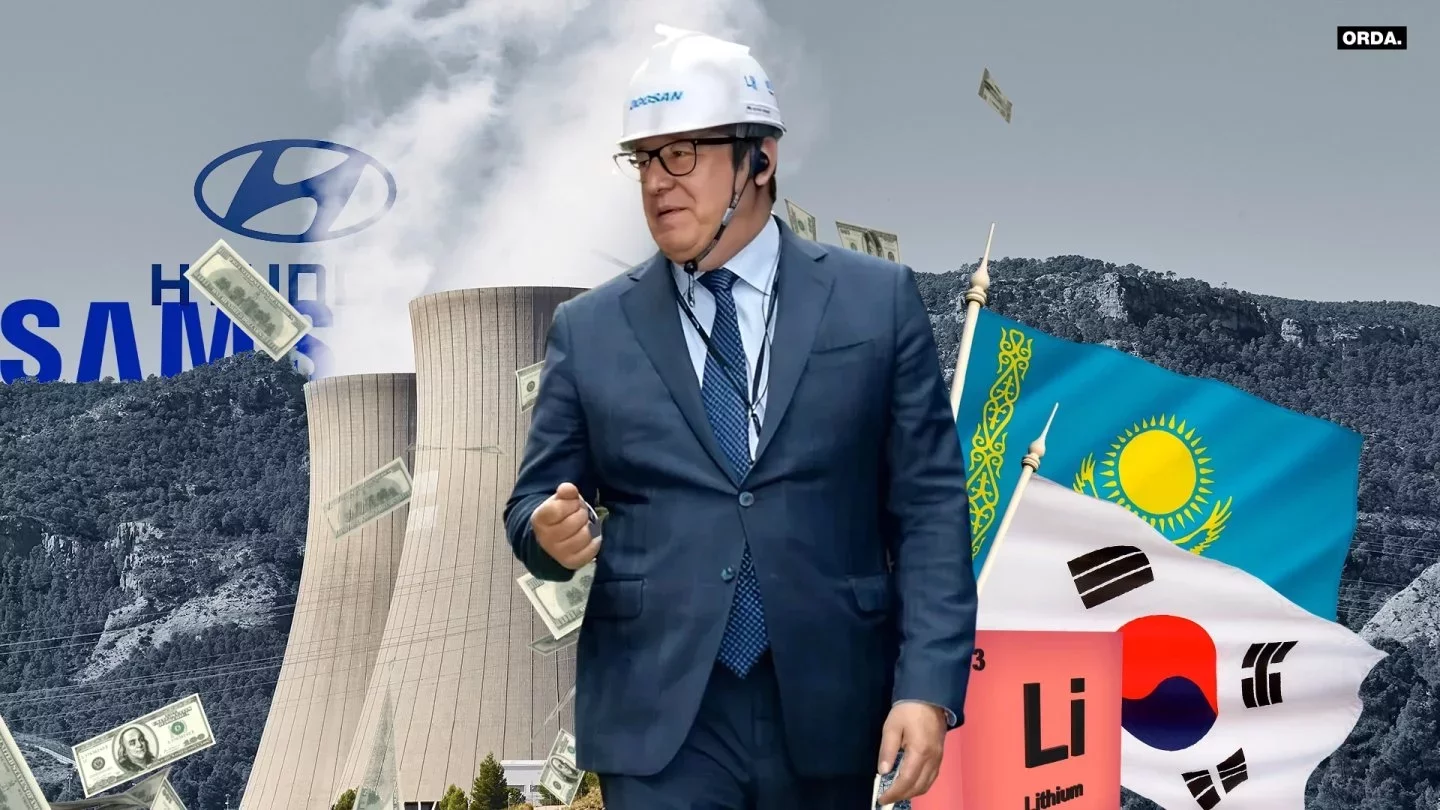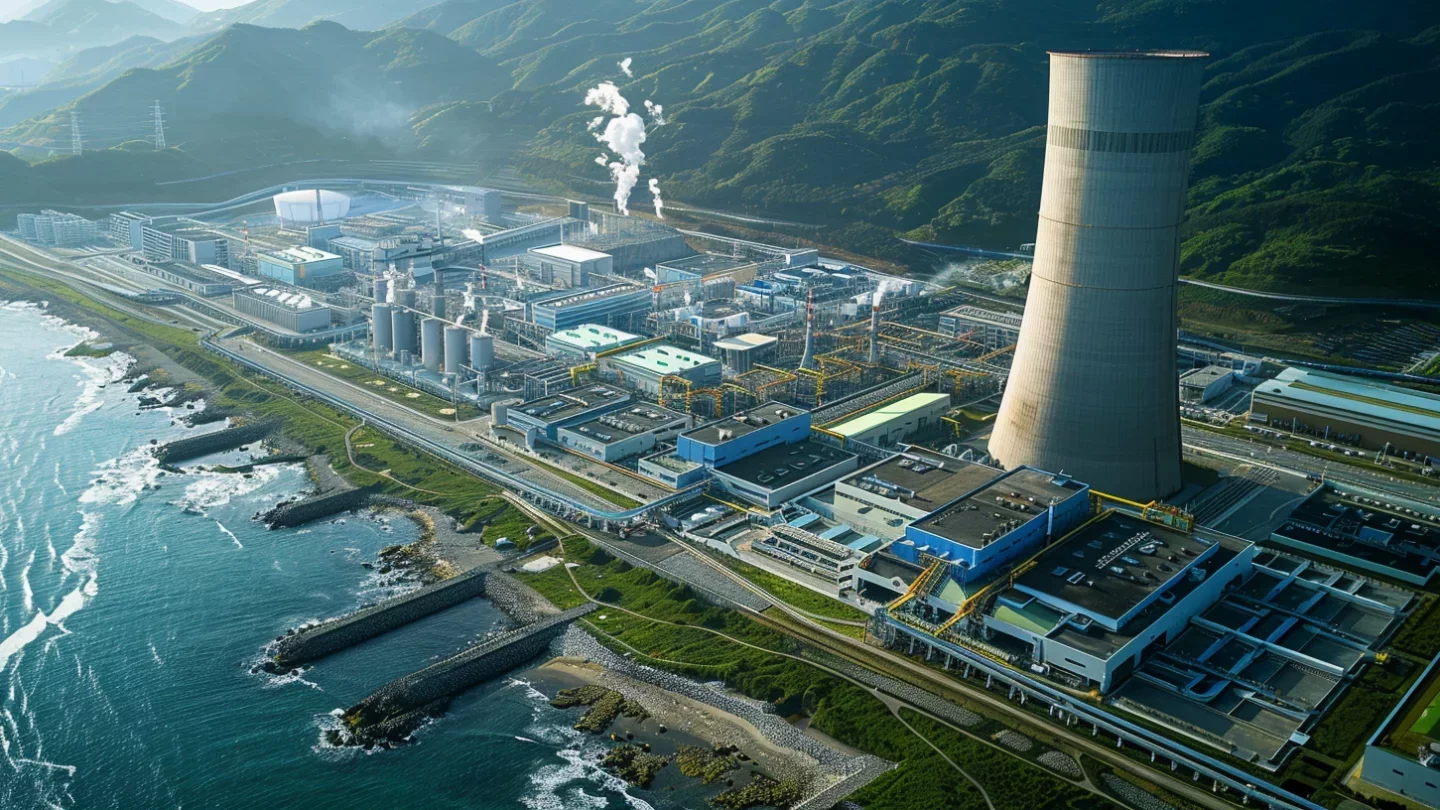Kazakhstan NPP: Why Did Energy Minister Visit Seoul?
 Collage Orda.kz
Collage Orda.kz
In late October, Kazakhstan's Energy Minister Almasadam Satkaliyev visited South Korea and met with representatives of leading Korean companies. Nuclear energy was the main topic, Orda has looked into the details.
As The Times of Central Asia writes, nuclear energy was central to the talks in Seoul. Almasadam Satkaliyev also discussed possible cooperation in the oil and gas sector and renewable energy sources with the South Korean Minister of Trade, Industry, and Energy.
Almasadam Satkaliyev also met with representatives of leading Korean companies - Doosan Enerbility, Korea Hydro & Nuclear Power (KHNP), Korea Electric Power Corporation (KEPCO), Korea National Oil Corporation (KNOC), and Samsung.
He discussed South Korea's possible participation in the international consortium to build Kazakhstan's first nuclear power plant. Kazakhstan is currently studying possible models for implementing this project—the final decision, according to Almasadam Satkaliyev, will be made in 2025.
Negotiations with Doosan Enerbility ended with the signing of a memorandum of understanding. This document will allow the localization of the Korean company's production in Kazakhstan and the establishment of its representative office in Astana, The Times of Central Asia notes.
The Korean company is cooperating with Kazakhstan to construct a one-gigawatt gas turbine power plant, which will be launched in the Turkestan region.

KHNP is a potential key partner in constructing Kazakhstan's first NPP. Other companies that could contribute to the project include Rosatom, France's EDF, and China's CNNC.
I don't think that South Korea's participation in the construction of the NPP has already been decided. Rather, the Ministry of Energy of Kazakhstan is carrying out the promised meritocratic work, studying various realistic projects. Now it is South Korea, but it is possible that Almasadam Satkaliyev will also visit Rosatom sites or Chinese companies, French enterprises. This is simply consistent work on selecting and studying potential suppliers, says political scientist Gaziz Abishev.
However, political scientist and economist Anuar Bakhitkhanov believes that the visit to South Korea is significant for understanding how the shares of participation in the consortium of NPP builders will be distributed.
South Korea is a proven specialist in NPPs, and they already have successful examples, such as the construction of a NPP in the UAE. Korea wants to export its technology, and Kazakhstan, which has large uranium reserves, is interested in developing nuclear energy. This looks like a mutually beneficial partnership. However, for now it is not a 'yes,' but only a serious 'maybe.' Questions remain, and it is necessary to discuss how to combine the interests of both parties, including the environmental and economic aspects of the issue, Anuar Bakhitkhanov points out.
South Korea possesses large energy companies and advanced technical solutions that can help Kazakhstan modernize its energy system. A decade ago, Kazakhstan relied on Korean expertise to solve the problem of electricity losses during transmission through networks.
Since then, cooperation with South Korea in this area has only deepened — both at the business and consumer market levels. For companies such as Samsung, Kia, and Hyundai, Kazakhstan is now an important export destination.
Kazakhstan's Rare earth metals are necessary for producing modern technology and batteries for electric vehicles, making them appealing to the Koreans. A Korean company will also develop deposits of this metal in the East Kazakhstan region.

South Korea seems to be really counting on Kazakhstan as a permanent partner. An important point is the agreement on rare earth metals, which are critical for Korean technologies and industry. Kazakhstan, with its rich resource base, can take advantage of this interest and attract Korean technologies to develop its industry , notes Anuar Bakhitkhanov.
According to the political scientist, such a long-term partnership looks promising. However, for now, both sides’ approaches to economic cooperation can be called cautious. Astana and Seoul are evaluating how profitable and stable the cooperation will be before signing contracts for decades.
We have, in principle, extensive cooperation with South Korea, and it continues to develop. The market conditions for rare earth metals are changing - Korea is growing and continuing to expand, and we are increasingly opening up to the world, to investment. These two factors coincide. This is a long-standing natural process, a progressive increase in economic activity,
emphasizes Gaziz Abishev.
The Dragon
Another critical question is whether China will be concerned about close cooperation between Kazakhstan and South Korea. China is also actively entering Kazakhstan with its projects, primarily in green energy. For example, China plans to build wind power plants in the Jambyl and Pavlodar regions with a total capacity of one gigawatt.
Competition with Seoul in this sector could theoretically cause discontent in Beijing.

Here, Kazakhstan, of course, needs to be cautious. China is a key trading partner, especially in energy and resource extraction. For it, Central Asia is part of the Belt and Road Initiative, so Kazakhstan's increased cooperation with South Korea in nuclear energy may not go unnoticed. Kazakhstan will have to show that cooperation with Korea is not an attempt to bypass China, but rather an attempt to find a balance and take advantage of the opportunities of both countries. If it can maintain a balance, this will add weight and independence to the country in the international arena, Anuar Bakhitkhanov believes
However, cooperation between Kazakhstan and South Korea in the energy sector does not imply rivalry. According to Gaziz Abishev, close interaction with Seoul should not affect Astana’s close and constructive relations with Beijing.
We have purely pragmatic, economic cooperation with South Korea, it does not imply any military or, even more so, anti-Chinese cooperation. So, in this regard, there's no risk, especially since a large number of countries cooperate with South Korea - and China itself too,
Gaziz Abishev
Original Author: Nikita Drobny
Latest news
- Ukrainian Prime Minister Denys Shmyhal Submits Resignation
- Water Ministry Sends Advisor to Coordinate Water Supply in Turkistan Region
- Toqayev Calls for Accelerated Modernization of Utility Infrastructure
- President Signs Law On New Tax Code
- Farmers in Jetisay Report Water Shortage, Water Ministry Says Irrigation Is Ongoing
- Electricity from Waste: Chinese Investors to Build a Plant in Qaraganda
- Kazakhstan Plans to Finalize Nuclear Plant Project Documentation by 2026
- Armenia Rejects Any Notion of Delegating Control Over Its Territory
- Bektenov’s First Press Conference: Tariffs, VAT, Oil, and More
- Prime Minister Comments on Trade Data Discrepancies Between Kazakhstan and China
- Kazakhstan May Proceed with Independent Construction of Three CHP Plants
- Kazakhstan: Sentences Issued in Terrorism and Extremism Cases
- Kazakhstan Plans Financial Legislation Reform
- Kazakhstan Sees Increase in Oil, Gas, and Power Production
- Kazakhstan Reports 6.2% Economic Growth in First Half of 2025
- Baiterek Holding to Expand Support for Key Economic Sectors
- Kazakhstan's President Dismisses Deputy Defense Minister and Air Force Commander
- First Day of Perizat Kairat Trial Held
- Boris Akunin Sentenced to 14 Years in Absentia by Moscow Military Court
- 50 Days: US Could Impose “Very Severe Tariffs” on Russia and Its Trading Partners

